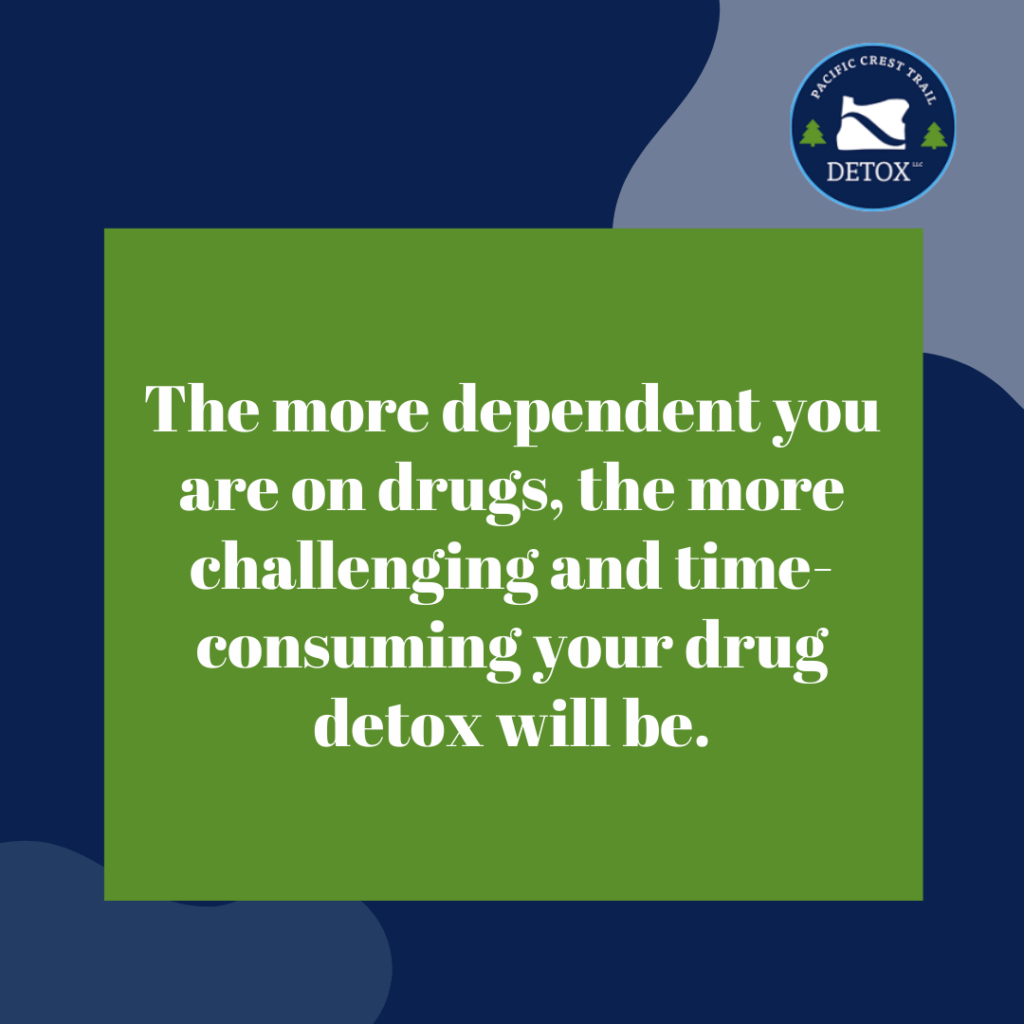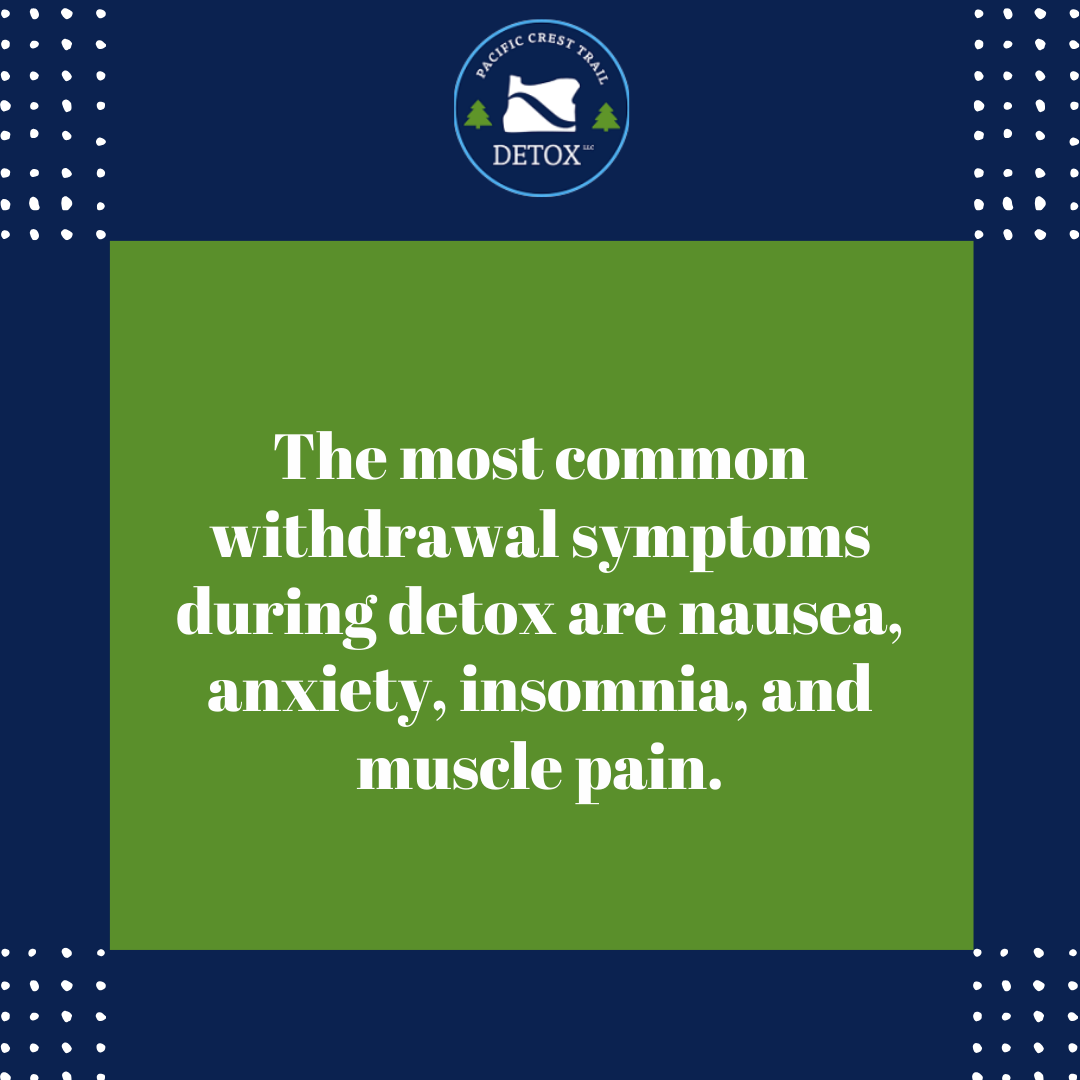Drug detox may sound like the last thing you want to consider while you’re at the peak of your addiction. After all, drugs fundamentally weave through your reward pathways, and it will always feel good when you turn to them.
But if you’ve found yourself reading this article, then you should be proud of yourself for considering addiction recovery.
Drug detox will be the most challenging step, but it’s also the most crucial one that will lead you toward a healthier life. If you’re ready to reach for sobriety, then continue reading.

What Is Drug Detox?
Drug detox is a supervised method of removing substances from your body. It handles the withdrawal symptoms that occur when you no longer use these drugs.
A detox may be an unpleasant experience, but it exists to prepare you for therapy and the rest of the recovery process.
Factors Affecting Detox Duration
There are a variety of key factors that could determine the duration of your drug detox.
Type Of Drug
The types of drugs you take will primarily affect your drug detox journey. Each drug will leave its unique effect on your brain chemistry, and your body will have different processes to break these drugs down.
For example, opioids and stimulants will interact with your system differently. Opioids will make you more vulnerable to physical pain, so that is where your withdrawal symptoms will mostly be centered.
Duration Of Use
The longer you use a drug, the more your body adapts to its presence, and the harder your brain has to work to adapt to its absence.
Abrupt cessation from these drugs after extended use will also make your withdrawal symptoms more pronounced. That said, your detox plan has to be more gradual and gentle on your overall system.
The more dependent you are on drugs, the more challenging and time-consuming your drug detox will be.

Individual Health Conditions
Drugs can affect your overall physiological health, so it’s also important to recognize and take note of any pre-existing conditions before your health professional can determine your recovery timeline.
Physical conditions such as liver disease imply that your body will have difficulty eliminating the drugs from your body, therefore requiring a longer detox duration.
Your mental health conditions, such as anxiety or depression, also have to be considered to prevent the worsening of your drug withdrawal symptoms.
Stages Of Drug Detox
Your health professionals would never recommend you to stop drugs abruptly. You would need to undergo different detox stages such as:
Evaluation And Assessment
The first stage of drug detox is an initial assessment of your physical and mental health and your substance use history. This allows your healthcare professionals to determine the most suitable detox approach for you.
They will typically gather information about your medical history, previous detox attempts (if any), and any existing health conditions. Alongside this, they will also identify any potential risks and complications during the detox process.
Stabilization
Before you begin with abstinence, your healthcare professionals first have to make sure that you are healthy enough to ensure that the detox process will be safe.
On the physiological level, you may get medications and processes to manage and alleviate your early withdrawal symptoms.
You will also have emotional support, such as counseling and therapy, to help you cope with any distress and emotional challenges during detox.
Early Abstinence
Early abstinence is the peak of your physical withdrawal symptoms. As your body adjusts, you’ll experience nausea, sweating, anxiety and insomnia.
Drug addiction specialists will monitor you closely so they can promptly intervene with symptoms and complications.

Full Detoxification
At the detox stage, your body has already completed the detoxification process, and your withdrawal symptoms would have gradually diminished.
This means that you can advance to the next stage of substance abuse treatment, such as joining a rehabilitation program or attending regular counseling.
At this stage, it’s crucial for you and your doctors to plan your next steps for recovery.
Long-Term Recovery
This is the stage where you’re implementing strategies to sustain your sobriety. You will have a personalized prevention plan with your counselors to navigate any of your potential triggers post-detox.
Managing Withdrawal Symptoms
The most common withdrawal symptoms during detox are nausea, anxiety, insomnia, and muscle pain.
Regardless of which symptoms you may be going through, here are some strategies on how you could handle them:
- Medication. You may be prescribed medications to alleviate some of your symptoms.
- Eat balanced meals. Diet plays a big role in your physiological and mental health. Stay hydrated and eat meals that are rich in proteins and vitamins.
- Emotional support. Support during withdrawal will help you minimize relapse. Surround yourself with those that have similar goals or can keep you grounded in your recovery.
- Exercise regularly. Physical movement will help your brain restore chemical balance and reduce any anxiety, stress, or tension during detox.
After Detox: Next Steps In Recovery
After detox, you’re officially on your way towards sustained recovery. While detox addresses eliminating the substances from your body, it’s just as vital to make sure that you can safely and sustainably stay away from these drugs.
Here is a summary of your next steps in recovery:
- Treatment planning. You will be working with your healthcare professionals to develop a treatment plan suited to your needs, goals, and potential setbacks.
- Rehabilitation programs. Your treatment plan will most likely include an immersive rehabilitation program where you can be monitored and learn about coping skills.
- Counseling and therapy. Counseling and therapy are where you can explore your triggers and the roots of your substance abuse.

In Conclusion
Drug detox will be a long and challenging journey depending on your drug exposure, time with drugs, and overall health. But by being gentle with yourself, taking your time, and adopting a healthier lifestyle, it’s not impossible.
Detoxification is just the start, and it’s a great one that’s worth celebrating. You’re now one step closer to sobriety and will continue to go towards it with the right goals and grounding.If you’re ready to begin your drug detox and recovery process, contact Pacific Crest Trail today!
